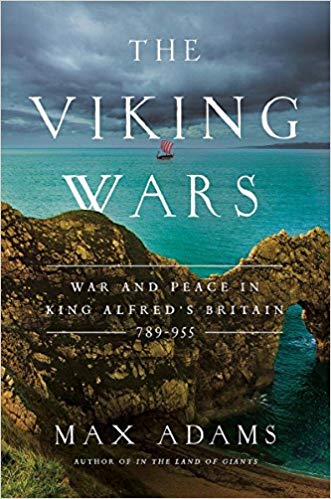 Adams, Max. The Viking Wars: War and Peace in King Alfred’s Britain, 789-955. New York: Pegasus Books, 2018.
Adams, Max. The Viking Wars: War and Peace in King Alfred’s Britain, 789-955. New York: Pegasus Books, 2018.
From first cracking open In the Land of Giants (hopefully coming soon to a Concerning History book club near you), I have been enthralled with what I’ve come to call Max Adams’ Dark Ages Trilogy. Now at last I’ve come to what, for many, is the main event: the cataclysmic clash of cultures—Roman Christian Anglo-Saxon, Irish Christian Celtic and Brythonic, and Pagan Scandinavian—that define the ninth and tenth centuries and the British Isles themselves to this day. Eagerly anticipating Adams’ historical treatment of such oft-tread ground, I dove right in. While I was mostly satisfied by the end, however, as with most endings, I was left wanting just a little bit more.
For most, the third and final period of great European migration of the first millennium AD (preceded by the fifth-century movement of Germanic peoples and sixth-century movement of Slavic peoples) is known as the Viking Age, and can probably be summed up in a few sentences. Scandinavian raiders raid coastlines and burn monasteries, and eventually Alfred the Great of Wessex drives them back and unites the kingdom of England. This common perception barely scratches the history of two centuries of warfare and political maneuvering, however. I’ve previously praised the BBC/Netflix adaptation of Bernard Cornwell’s Last Kingdom novels for telling the (modified) tale of the decades and centuries following Alfred’s victory at Ethandon (modern Eddington), and Max Adams brilliantly does the same in his usual immersive prose. From the courtly politics of Wessex, Mercia, and Northumbria to what daily life may have been like in areas of Scandinavian settlement to notions of kingship, war, and statebuilding, Adams comes the closest I’ve yet seen to dropping the reader right into the ninth century British Isles. Be warned, though: as his subtitle suggests, Adams is concerned with the history of these events looking outward from Britain. If you seek a comprehensive history of all Scandinavian movement throughout Europe and the Mediterranean, this is not the book you’re looking for.
Alas, that he could not keep writing and writing. All books must come to an end, and Adams chooses to end The Viking Wars with the ousting of a Norse dynasty from the city of York in AD 955. This was a strange decision for me, however, as the conflicts between Scandinavian and Anglo-Saxon armies would not end for another century. Indeed, a Danish lord would usurp the English throne in 1016, and the luckless Harold Godwinsson would defeat the last Danish invasion in 1066, just days before losing the battle of Hastings to William the Conqueror, scion of Scandinavians who had settled Normandy in the ninth century. Though already over 500 pages, I would have loved another three hundred pages from Adams to guide the reader through to the end of Anglo-Saxon England.
Adams’ choice of end point also conveniently masks another oversight in his history. Admirably, The Viking Wars attempts to dispel myths that Alfred (or any of the other great British dynasts of ninth and tenth century Scotland and Ireland) forged a single, unified kingdom in the high medieval sense of the word. By the time the book ends in 955, the kings of Wessex are still only chief among lesser nobles, putting together their patchwork of client states anew each time an old king dies and his heir ascends. Adams is careful to note this fact, yet fails to mention that in only fifty years, that unified kingly idea would be realized in full. Getting there is clearly not Adams’ concern in The Viking Wars, however, and so readers must look elsewhere (or perhaps to Adams’ next book, whatever that may be).
Despite my personal critiques, though, I recommend The Viking Wars just as highly as all of Adams’ other works. No matter if you are a seasoned historian or budding novice, early medieval history as told by this master of the Dark Ages is a delight to read, and will surely leave you wanting to delve even deeper into this misty period of history.
